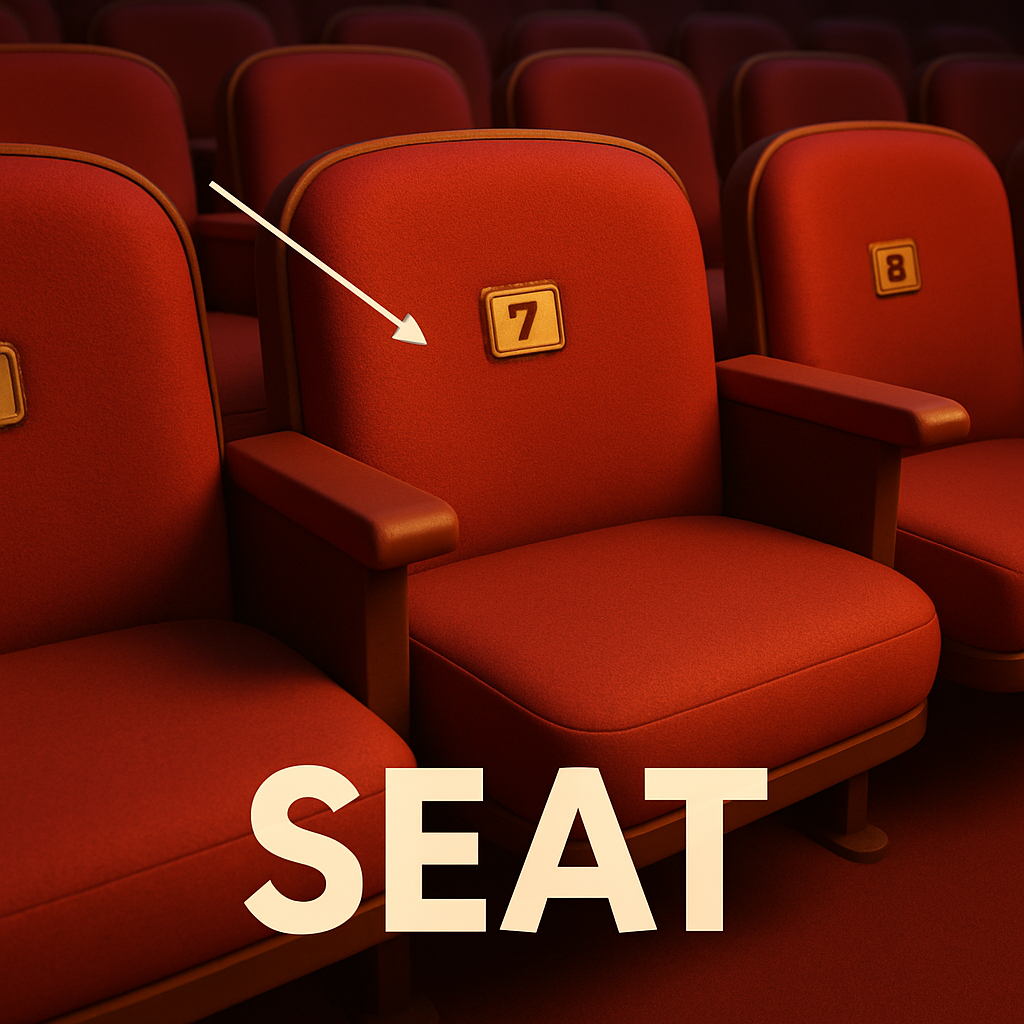Seat
Definition
The term "seat" describes a place to sit or the part of a chair, vehicle, or structure designed for sitting. It can also refer to a position of authority or a location.
Parts of Speech
- Noun
- Verb
Pronunciation
American English
- IPA Pronunciation: /siːt/
- Respelling: SEET
British English
- IPA Pronunciation: /siːt/
- Respelling: SEET
Etymology
The word "seat" originates from Old Norse "sæti," meaning "position, site," and was integrated into Middle English through Old English "setl." It initially referred to a place for sitting and later expanded to include positions of authority or locations.
Derivatives
- Seating (noun)
- Seated (adjective/verb)
- Seatbelt (noun)
- Seatable (adjective)
- Reseat (verb)
Synonyms
- Chair
- Bench
- Spot
Antonyms
- Standing
- None
Usage
The term "seat" is commonly used in contexts involving furniture, vehicles, or positions of authority. For example: "Please take a seat," or "The senator holds a seat in Congress."
Related Terms
- Chair: A piece of furniture designed for sitting.
- Throne: A ceremonial seat of authority.
- Position: A role or location, often metaphorical.
Detailed Definitions
Noun
- A place designed for sitting: Refers to a specific location for resting or sitting.
- Example: "Each seat in the theater was numbered."
- A position of authority or representation: Refers to a role or office, often in a governing body.
- Example: "She won a seat in the House of Representatives."
- A location or site: Refers to a place of importance or residence.
- Example: "The company’s headquarters is the seat of its operations."
Verb
- To provide or assign a seat: Refers to the act of seating someone or arranging seating.
- Example: "The usher seated the guests in the front row."
- To sit or place oneself: Refers to the act of taking a position on a seat.
- Example: "She seated herself on the bench."
seat



🇨🇳 Mandarin
- 座位 (zuòwèi) - Place to sit
- IPA: [tswɔ̂.wèi]
- Respelling: dzwoh-way
- 席位 (xíwèi) - Position of authority or influence
- IPA: [ɕǐ.wèi]
- Respelling: shee-way
🇮🇳 Hindi
- कुर्सी (kursī) - Place to sit
- IPA: [kʊɾsi:]
- Respelling: kur-see
- सीट (sīṭ) - Position of authority or influence
- IPA: [si:t̪]
- Respelling: see-t
🇪🇸 Spanish
- Asiento - Place to sit
- IPA: [a'sjen̪to]
- Respelling: ah-syen-to
- Escaño - Position of authority or influence
- IPA: [es'kaɲo]
- Respelling: es-kah-nyo
🇫🇷 French
- Siège - Place to sit
- IPA: [sjɛʒ]
- Respelling: sy-ezh
- Poste - Position of authority or influence
- IPA: [pɔst]
- Respelling: pohst
🇦🇪 Modern Standard Arabic
- مقعد (mak'ad) - Place to sit
- IPA: [mæˈʔæːd]
- Respelling: ma-'aad
- منصب (mansab) - Position of authority or influence
- IPA: [ˈmænsæb]
- Respelling: 'mansab
🇧🇩 Bengali
- আসন (āsana) - Place to sit
- IPA: [ɑːson]
- Respelling: ah-son
- পদ (pada) - Position of authority or influence
- IPA: [pɔd̪]
- Respelling: pod
🇷🇺 Russian
- Сиденье (sidene) - Place to sit
- IPA: [sʲɪˈdʲenʲɪje]
- Respelling: si-'dye-ni-ye
- Место (mesto) - Position of authority or influence
- IPA: [ˈmʲestə]
- Respelling: 'myes-tuh
🇵🇹 Portuguese
- Assento - Place to sit
- IPA: [ɐˈsẽtu]
- Respelling: a-'sen-too
- Cargo - Position of authority or influence
- IPA: [ˈkaɾɣu]
- Respelling: 'kar-goo
🇮🇩 Indonesian
- Kursi - Place to sit
- IPA: [ˈkʊrsi]
- Respelling: 'kur-see
- Posisi - Position of authority or influence
- IPA: [poˈsisi]
- Respelling: po-'see-see
🇩🇪 German
- Sitz - Place to sit
- IPA: [zɪts]
- Respelling: zits
- Stelle - Position of authority or influence
- IPA: [ˈʃtɛlə]
- Respelling: 'shtel-uh
🇯🇵 Japanese
- 座席 (zaseki) - Place to sit
- IPA: [za̠se̞ki]
- Respelling: zah-seh-ki
- 地位 (chii) - Position of authority or influence
- IPA: [t͡ɕi.i]
- Respelling: chee-ee
🇻🇳 Vietnamese
- Ghế - Place to sit
- IPA: [ɣe̞˧˧]
- Respelling: gheh
- Vị trí - Position of authority or influence
- IPA: [vi˨˩ t͡ɕi˧˥]
- Respelling: vee chee
🇰🇷 Korean
- 자리 (jari) - Place to sit
- IPA: [t͡ɕaɾi]
- Respelling: jah-ree
- 자리 (jari) - Position of authority or influence
- IPA: [t͡ɕaɾi]
- Respelling: jah-ree
🇹🇷 Turkish
- Koltuk - Place to sit
- IPA: [koɫ'tuk]
- Respelling: kol-tuk
- Mevki - Position of authority or influence
- IPA: ['mevci]
- Respelling: 'mehv-kee
🇵🇰 Urdu
- کرسی (kursī) - Place to sit
- IPA: [kʊɾsi:]
- Respelling: kur-see
- اسامی (asāmī) - Position of authority or influence
- IPA: [ɑːsɑːmi:]
- Respelling: ah-sah-mee





